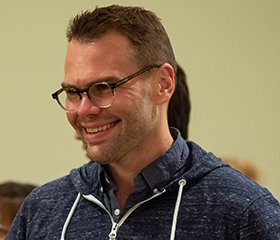There’s a scene in Greater Clements, the new play by Samuel D. Hunter, beginning performances in the Newhouse on November 14th, in which characters attempt to turn a couch into a pull-out bed. The furniture undergoes a transformation just as, in other ways, Hunter’s work as a writer has known transformation. “I’m not sure when I was starting out I would have written that bed scene the same way, or at all,” Hunter told me the other day after a rehearsal. “My plays have become more specific. I needed to loosen my authorial grip on the characters.”
Loosening his grip, continued Hunter, who grew up in Moscow, Idaho, before coming east to attend NYU, “allowed my plays to breathe a little more. In the beginning, I was working to get them produced, and I thought good writing involved having control over everything. But when you loosen your grip you are no longer writing towards a single thesis.”
Or towards a grand metaphor, even though some of Hunter’s constructs seem to invite symbolic interpretation. His marvelous 2012 play, The Whale, for example, is about an over-weight man, and Greater Clements takes place in a small Idaho town where a mine has closed. “I can see the mine being viewed as a metaphor,” Hunter said, “but it’s not one corresponding directly to a current political or social reality. The central thing going on my the play is the shutting-down of the characters themselves.”
“Disconnection recurs in my plays,” Hunter said, and among those works, produced with the invaluable input of the director Davis McCallum, is the 2014 Pocatello and the 2018 two-parter Lewiston/Clarkston. “Disconnection from friends, family – from society.” Another commonality, he added, is that “the people are always trying to save each other.”
How did this Idaho native connect to playwriting? “I did community theater as a kid,” Hunter said. “Things like The Sound of Music and Agatha Christie mysteries. But I wasn’t seeing a lot of contemporary plays.” Encountering Allen Ginsberg’s poetry helped spur him creatively. “Reading Ginsberg’s poem ‘Kaddish’ was the first time I was moved to tears by a piece of writing.” Formative theatrical experiences included reading Our Town and seeing the first part of Angels in America at the University of Idaho.
Some of Hunter’s early pieces were experimental, but he eventually moved into more realistic territory. With Greater Clements he finds himself working a more classic-American vein. “I love many of the great three-act plays like The Crucible.” He added: “There’s a kind of structural call-back in writing a big three-act play – I’m attracted to their boldness.”
Hunter doesn’t see himself as a regional writer. “That phrase,” he explained, “seems to describe something pastoral or nostalgic. My plays are not pastoral or nostalgic.” He maintains that his dramas are not telling specifically Idahoan stories. Referring to his 2010 play A Bright New Boise, he said, “It’s set in a Hobby Lobby and that could be anywhere in America. And Pocatello is set in an Olive Garden, and Olive Gardens look the same throughout the U.S.”
Speaking of his career in general, Hunter said, “It’s not about any one play – it’s about the body of work. In certain ways the plays are like different chapters in the same book.” But the stories, he added, are tailored for the theater. “I don’t think Greater Clements would work as a novel. I think it’s a story that’s meant to be experienced communally. There’s no villain in this play -- every single character is trying to do good.”
Brendan Lemon is the editor of lemonwade.com
